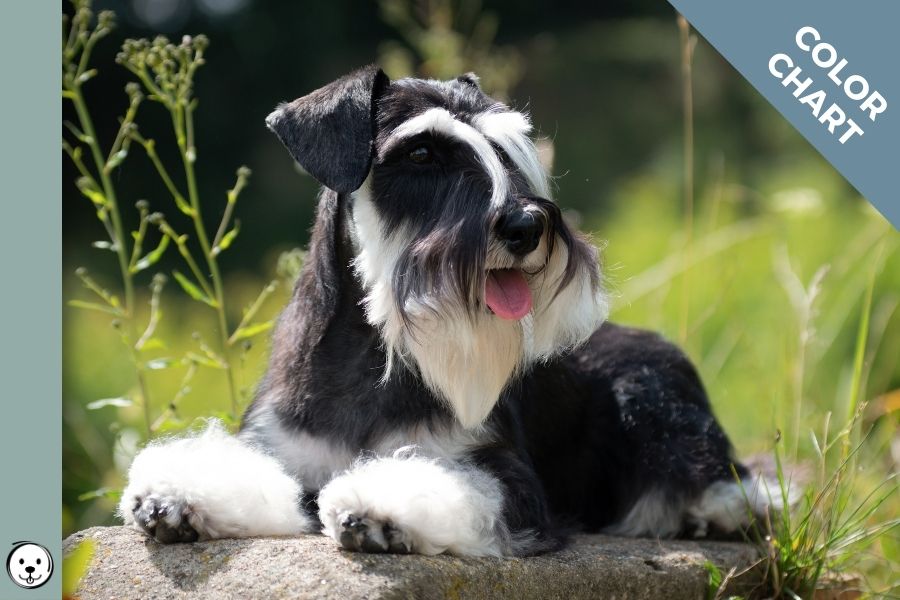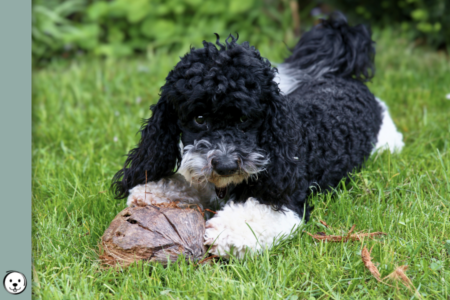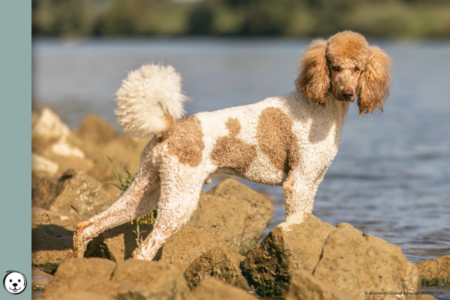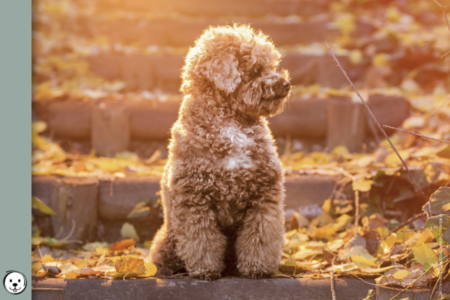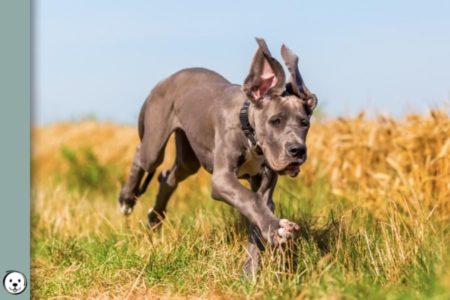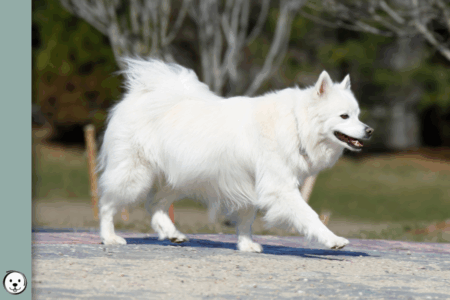An overview of Miniature Schnauzer colors and their genetics.
| D/- B/- non-diluted black | aw/- agouti | at/- tan points | a/a recessive black |
| E/- wild type ky/ky wild type |  agouti “salt & pepper” |  tan points “black & silver” |  recessive black “black” |
| E/- wild type KB/- dominant black |  dominant black “black” |  dominant black “black” |  dominant black “black” |
| e/e recessive red | 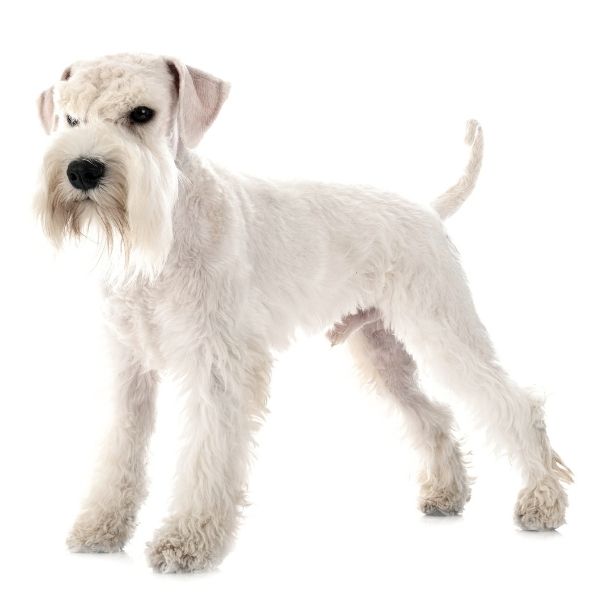 recessive red “white” |  recessive red “white” |  recessive red “white” |
Miniature Schnauzer Color Overview
A short discussion of breed standard patterns in the Miniature Schnauzer:
Black Miniature Schnauzer
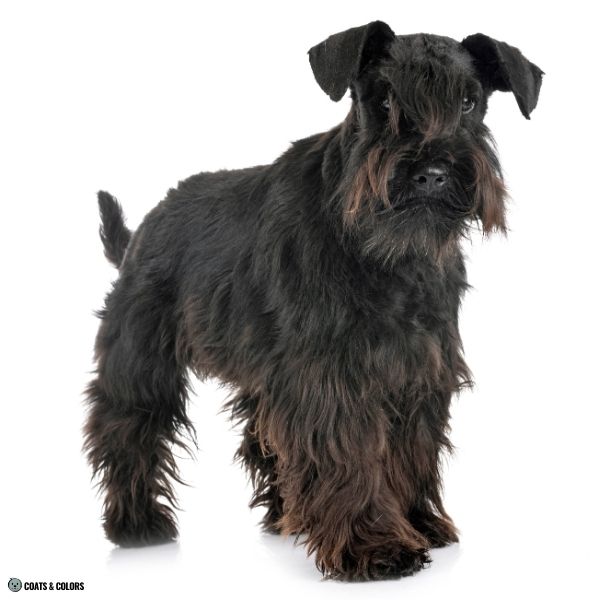
Black Miniature Schnauzers are most often dominant black (KB). But recessive black (ky/ky a/a) was also found in this breed.
Both produce a solid black coat.
Dominant Black:
| E LOCUS | K LOCUS | A LOCUS |
|---|---|---|
| E/- | KB/- | – |
Recessive Black:
| E LOCUS | K LOCUS | A LOCUS |
|---|---|---|
| E/- | ky/ky | a/a |
White Miniature Schnauzer

White Miniature Schnauzers (only accepted by the FCI) are recessive red with a very pale red intensity.
This gives a solid white coat.
| E LOCUS | E LOCUS | A LOCUS |
|---|---|---|
| e/e | – | – |
Salt & Pepper Miniature Schnauzer
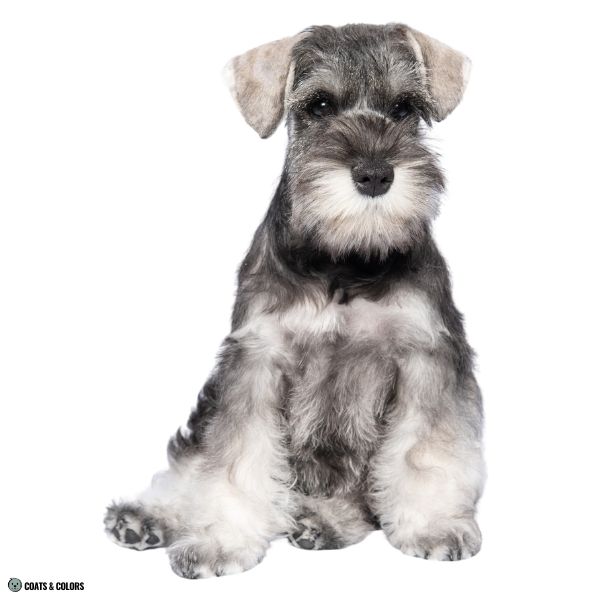
The breed term “salt & pepper” refers to a black-based agouti pattern with a very pale red intensity, creating the illusion of a gray coat.
Agouti gives banded hairs on the dogs body, legs and face. The pattern includes some clear markings on the cheeks, chest, or lower legs.
| E LOCUS | K LOCUS | A LOCUS |
|---|---|---|
| E/- | ky/ky | aw/- |
Black & White Miniature Schnauzer
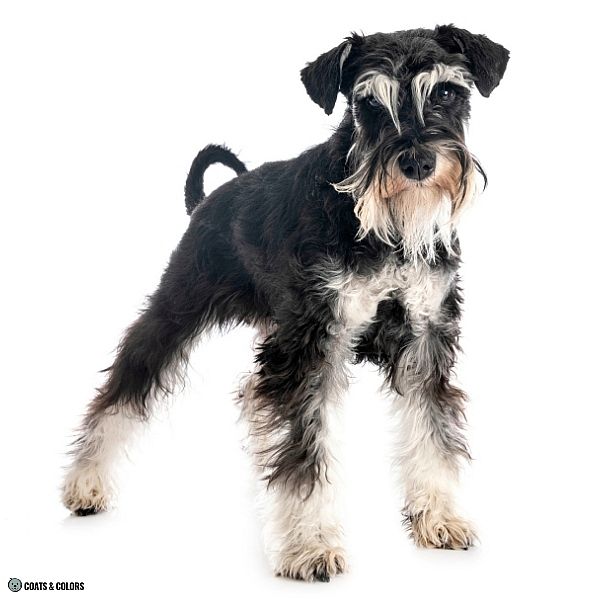
The breed term “black & silver” refers to a black-based tan point pattern with a very pale phaeomelanin intensity in their tan markings.
This pattern is similar to agouti.
But instead of banded hairs, these dogs produce a solid black body coat. This creates a sharp contrast to their clear silver markings or “points“.
| E LOCUS | E LOCUS | A LOCUS |
|---|---|---|
| E/- | ky/ky | at/- |
Miniature Schnauzer Color Genetics Summary
These are color traits that occur in Miniature Schnauzer:
| E-LOCUS | Em = melanistic mask E = normal pattern e = recessive red |
| K-LOCUS | KB = dominant black kbr = brindle ky = normal pattern |
| A-LOCUS | Ay = sable aw = agouti at = tan points a = recessive black |
| B-LOCUS | B = black eumelanin b = brown eumelanin |
| D-LOCUS | D = normal pigment |
| Intensity | white wheaten, tan, red |
| Graying | G = progressive graying g = no graying |
| S-LOCUS | S = solid sP = white spotting |
| M-LOCUS | m = non-merle M* = merle |
Miniature Schnauzer Colors
What colors do Miniature Schnauzers come in?
Eumelanin
All standard-colored Miniature Schnauzers are fixed for black eumelanin (B/B).
However, chocolate brown (b/b) is popular in color breeding.
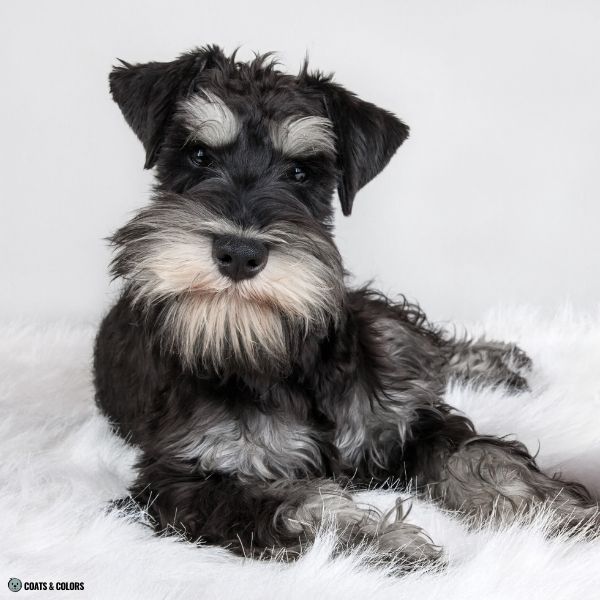
Phaeomelanin
The phaeomelanin in Schnauzers was selected to be as light as possible. This is why all their patterns with phaeomelanin (agouti, tan point, recessive red) come with white or silver pigment.
Other breeds show the same patterns with a lot more intense colors like cream, yellow, or red.

Black-based agouti with pale phaeomelanin

Black-based agouti with red phaeomelanin
Progressive Graying
Some salt and pepper Miniature Schnauzers show obvious signs of graying.
This causes their black hair banding ito fade into a uniform light gray coat. Very strong graying can go so far as to produce what color breeders call a “platinum silver Miniature Schnauzer“.
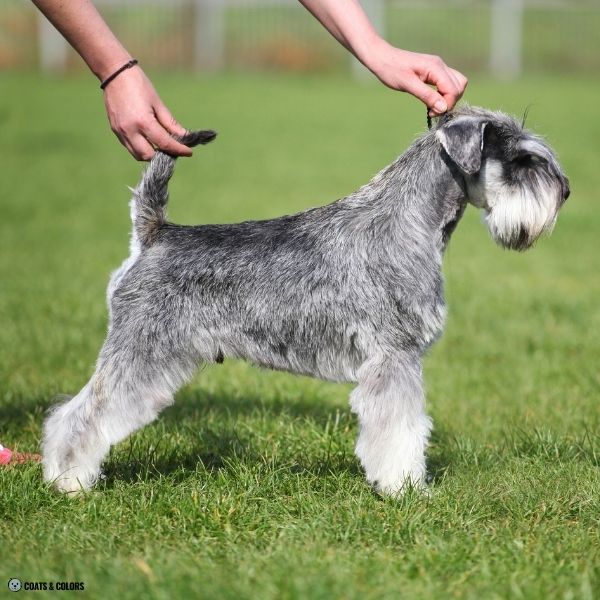

White Spotting
Officially, there is no white spotting in Miniature Schnauzers.
Some breeders produce “parti” Miniature Schnauzers with white markings.
Merle
There is no merle in purebred Schnauzers.
But of course it was introduced into this breed to produce fancy colors.
Eye Color
Miniature Schnauzers with a black-based pattern will mostly have dark brown eyes.
If the dog has liver brown pigment, his eyes might be a lighter honey or yellow.
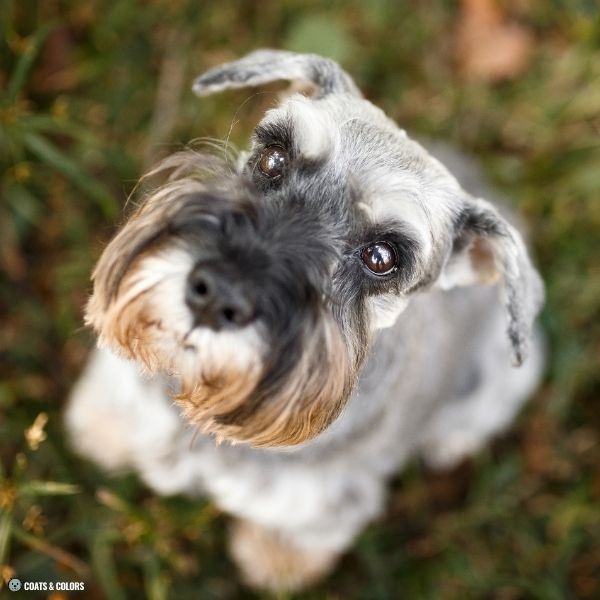
“Eyes – Small, dark brown and deep-set.”
AKC Breed Standard
“Eyes […] dark with lively expression”
FCI Breed Standard
Nose Color
Dogs that produce black eumelanin will also have a black nose.
And chocolate Miniature Schnauzers will have a brown nose.
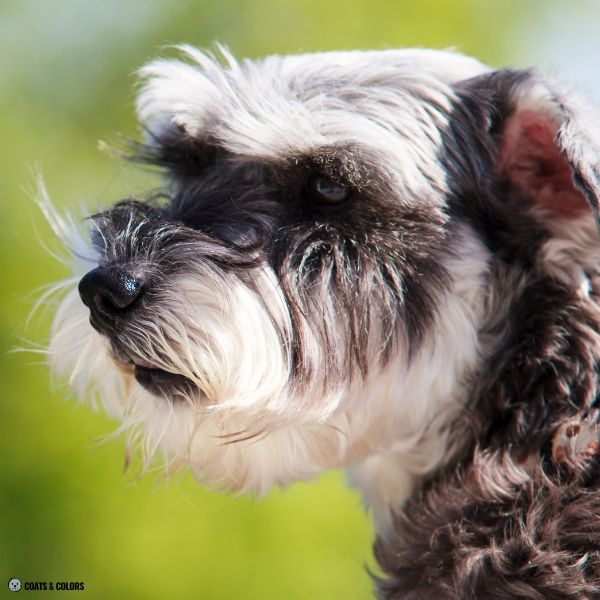
“[…] the nose must be solid black.”
AKC Breed Standard
“Well developed nose leather, always black.”
FCI Breed Standard
Miniature Schnauzer Patterns
What patterns can a Miniature Schnauzer have?
-
-
E/--
ky/ky-
aw/--
agouti
"pepper & salt"
-
-
at/--
tan points
"black & silver"
-
-
a/a-
recessive black
"black"
-
-
-
KB/--
dominant black
"black"
-
-
-
e/e-
recessive red
" white"
-
-
A Locus
Most Miniature Schnauzers come in either agouti “salt and pepper” (aw/-) or tan point “black and silver” (at/-). And some solid black Schnauzers are recessive black (a/a).
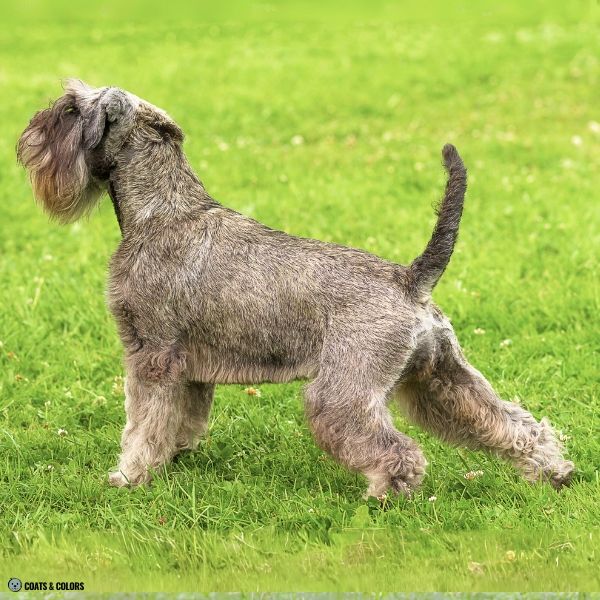
“salt & pepper”
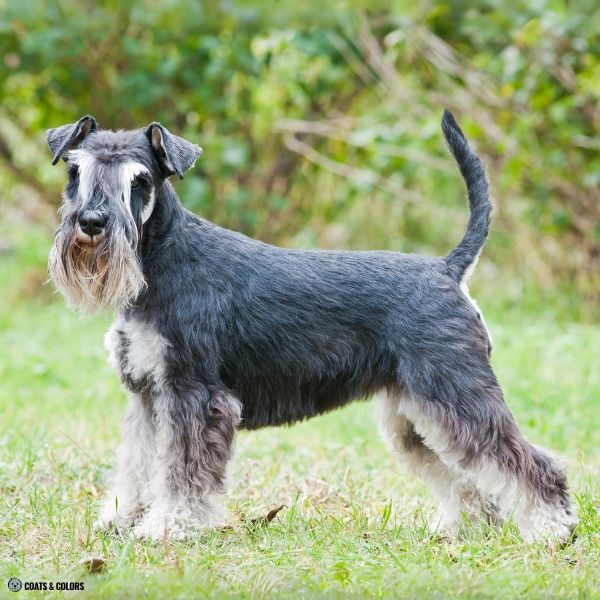
“black & silver”

“black”
Very few Minis have a sable variant (Ay) which produces a faulty pattern with a mostly silver coat and maybe some dark hair tipping on their back.
K Locus
Dogs that express their A locus pattern are ky/ky.
Most black Miniature Schnauzers are dominant black (KB/-). This overrides any A locus pattern they have and makes all their hair pigment cells produce only eumelanin.
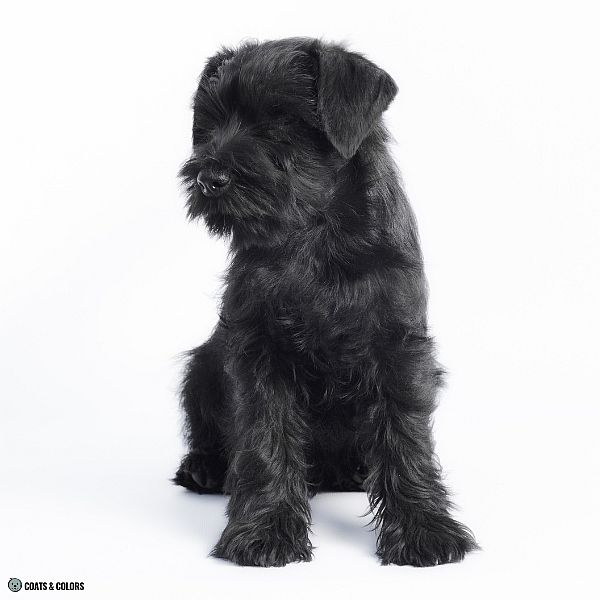
“black”
Apparently, brindle (kbr/-) has also been introduced via color breeding.
E Locus
Most Miniature Schnauzres are E/E at their E locus. This has no effect on their coat color other than just allowing their pattern to express. Some Schnauzers have a black mask (Em/-) on top of their pattern.
Recessive red (e/e) causes a solid phaeomelanic coat since dogs can not produce any black in their hairs. And with phaeomelanin being bred for a very very light intensity, these dogs are solid white.
A recessive red pattern will always override whatever a dog has on its A and K locus.

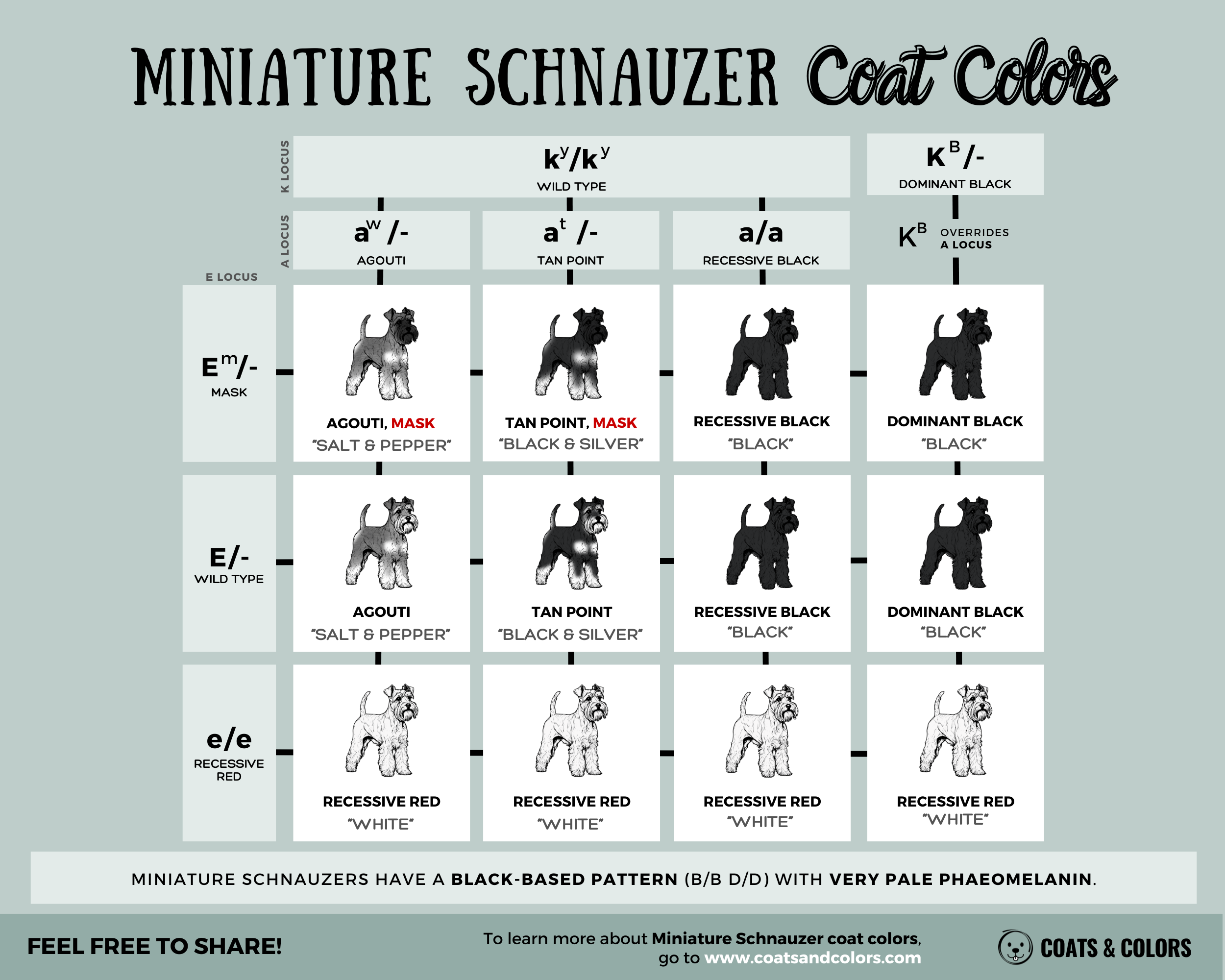
Mismarks and Fancy Colors
Miniature Schnauzers come in a variety of coat colors that are not officially recognized. Some of these off-colors have always been in the breed, others were brought in from other breeds.
- Parti Miniature Schnauzer (white spotting sP)
- Liver Miniature Schnauzer (brown eumelanin b/b)
- Merle Miniature Schnauzer (merle pattern M*)
- Sable Miniature Schnauzer (sable pattern Ay)
- Brindle Miniature Schnauzer (brindle kbr)
- Wheaten Miniature Schnauzer (cream, yellow or red phaeomelanin intensity)
- Platinum Silver Miniature Schnauzer (agouti + progressive graying)
Learn More
Links
[1] American Kennel Club (AKC): Official Standard for the Miniature Schnauzer (pdf)
[2] Fédération Cynologique Internationale (FCI): Minature Schnauzer Breed Standard (pdf)
[3] Dreger et al. (2019). True Colors: Commercially-acquired morphological genotypes reveal hidden allele variation among dog breeds, informing both trait ancestry and breed potential. PLoS ONE 14(10): e0223995. https://doi.org/10.1371/journal.pone.0223995
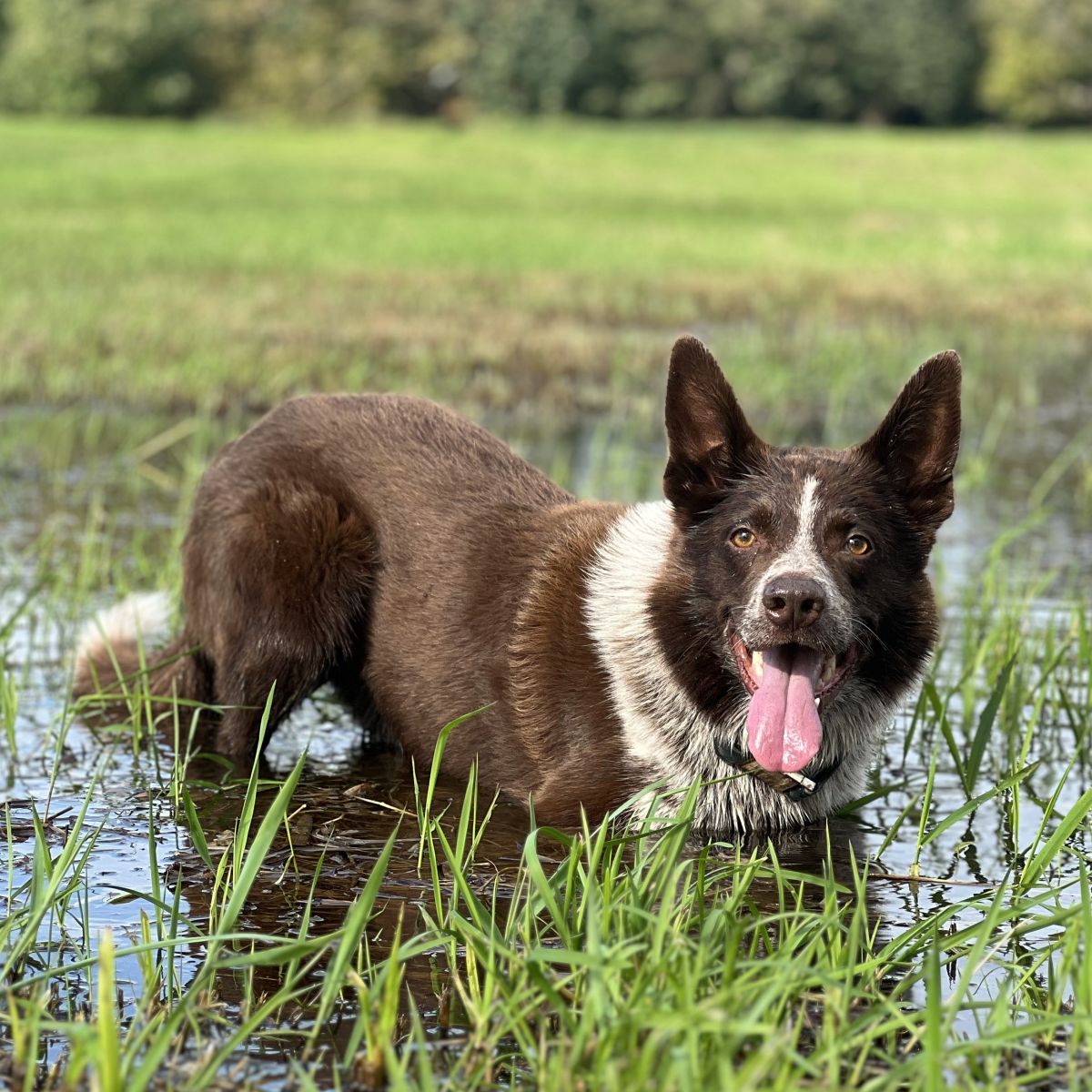
Hi! I’m Steffi. I am a biologist and a big time dog nerd. You are curious about coat color genetics? You’ve come to the right place! Read more.

